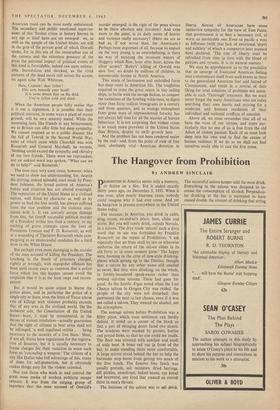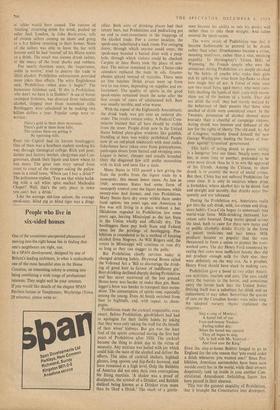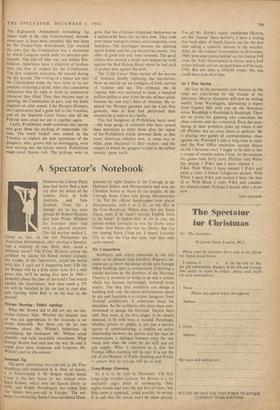The Hangover from Prohibition
By ANDREW SINCLAIR
nROHIBMON in America seems only a memory, r or fiction on a film. Yet it ended exactly thirty years ago, on December 5, 1933. When it was over, after nearly fourteen years, nobody could imagine why it had ever come. And yet its hangover is present everywhere in the United States today.
For instance, in America, you drink in cafes, drug stores, so-and-so's place, bars, clubs and stores. But you will rarely drink, outside Nevada, in a saloon. The drys made 'saloon' such a dirty word that its use was forbidden by Franklin Roosevelt on the repeal of Prohibition. `I ask especially that no State shall by law or otherwise authorise the return of the saloon either in its old form or in some modern guise.' The happy wets, boozing in the crop of new-style drinking- places which sprang up in the Thirties, thought that a saloon by any other name still smelled as sweet. But they were drinking, on the whole, in freshly-laundered speak-easies rather than revived old-time saloons. These had gone for good. As the Seattle Argus noted when the Last Chance saloon in Oregon City was raided, the people of the city were not disturbed; they patronised the next to last chance, even if it was not called a saloon. They wanted the alcohol, not the atmosphere.
The average saloon before Prohibition was a filthy place, which even sentiment can hardly defend. It stood on a corner of the block so that a pair of swinging doors faced two streets. The windows were masked by posters, bottles and potted ferns, so that no one could see inside. The floor was covered with sawdust and smelt of stale beer. A brass rail ran in front of the bar, to make standing there more comfortable. A large mirror stood behind the bar to help the bartender stop bums from getting too much of the free lunch. The famous free lunch was usually pretzels, salt minnows, dried herrings, dill pickles, sauerkraut, baked beans, rye bread and bratwurst, any food that created an eternal thirst in men's throats.
The business of the saloon was to sell drink. The successful saloon-keeper sold the most drink. Everything in the saloon was designed to in- crease the consumption of alcohol. Perpendicu- lar drinking at the bar is estimated to have caused double the amount of drinking that sitting
at tables would have caused. The custom of 'treating,' returning drink for drink, pushed up sales. Jack London, in John Barleycorn, tells of sixteen sailors coming on shore and going to a b:-.r before returning to their homes. None of the sailors was able to leave the bar with honour until he had 'treated' all his fifteen mates to a drink. The result was sixteen drunk sailors, at the mercy of the local s,harks and robbers.
For nearly fourteen years, the 'experiment, noble in motive,' tried to destroy the trade in illicit alcohol. Prohibition enforcement provided more jokes than effects. The witty Englishman said, 'Prohibition—when does it begin?' The humorous Irishman said, 'If this is Prohibition, why don't we have it in Dublin?' A sea of booze swamped frontiers, was diverted from industrial alcohol, slopped over from moonshine stills. Bootleggers were calculated to be making two billion dollars a year. Popular songs were re- written :
There's gold in them there mountains, There's gold in them there hills; The natives there are getting it By operating stills.
Even the Capitol had its known bootleggers. One of them was a Southern student working his way through theological college. Rich and poor, farmer and factory worker, clergyman and Con- gressman, drank their liquor and knew where to buy more. The great rum story spread from coast to coast of the stranger asking the police- man in a small town, 'Where can I buy a drink?' The policeman replied, 'You see that white build- ing with a tall white spire marked Methodist Chapel? Well, that's the only place in town you can't buy a drink.'
Like the average old-time saloon, the average speak-easy, blind pig or blind tiger was a dingy affair. Both sorts of drinking places had their luxury bars, but Prohibition and padlocking put an end to over-investment in the trappings of the alcohol trade. For a corner location, the speak-easy substituted a back room. For swinging doors, through which anyone could enter, the speak-easy boasted a barred door with a peep- hole, through which visitors could be checked. Carpets or bare floors took the place of saw- dust. The mirror remained in place. Cheese-cake calendars replaced the nude in oils. Gramo- phones played instead of victrolas. There were no free lunches. Drink prices went up from two to ten times, depending on supplies and en- forcement. The quality of spirits in the good speak-easies remained much the same after the first couple of years of adulterated hell. Beer was usually terrible, and wine worse.
With the repeal of the Eighteenth Amendment, the drink trade was put into an ordered dis- order. The results remain today. A Federal Com- mission insisted that all bars should be visible from the street. People drink now in the United States behind plate-glass windows like goldfish. Standing at bars was widely prohibited. People now sit on red-plush toadstools with steel stalks. Juke-boxes have taken over from gramophones, push-open doors from barred and swinging ones. Liquor is better, cheaper and usually branded. Only the disgusted few still prefer moonshine with its kick and taste like a mule.
Many States in 1933 passed a law giving the State the profits from the liquor trade by a monopoly; this meant lower taxes. As late as 1949, seventeen States had some form of monopoly control over the liquor business, while twenty-nine had licence, and two Prohibition. Many States have dry areas within them under local option; ten years ago, one American in five was still living in a place without a bar. Oklahoma repealed its Prohibition law some years ago, leaving Mississippi as the last State in the Union wholly and officially dry. The bootleggers there pay both State and Federal taxes for the privilege of bootlegging. Pro- hibition is considered to be a method of keeping alcohol from Negroes. As Will Rogers said, the voters in Mississippi will continue to vote dry as long as they can stagger to the polls.'
But Prohibition chiefly survives today in changed drinking habits. Heywood Broun called the Volstead Act a 'Bill to discourage the drink- ing of good beer in favour of indifferent gin.' Beer-drinking declined sharply during Prohibition and has never recovered all the lost ground. Home-brew was harder to make than gin. Boot- legger's brew was harder to transport than moon- shine. The consumption of spirits rose, especially among the young. Even Al Smith switched from beer to highballs, and, with repeal, to cham- pagne.
Prohibition made the cocktail respectable, even smart. Before Prohibition, gin-drinkers had had to apologise for their feeble habits by joking that they were only taking the stuff for the benefit of their wives' kidneys. But gin was the least foul of the spirits concocted during the first bad years of Prohibition after 1920. The cocktail became the thing to drink due to the virtue of necessity. Any mixture was hailed with joy which could hide the taste of the alcohol and deliver the effects. The sales of cocktail shakers, highball glasses, long spoons and hip-flasks boomed, and have remained at a high level. Only the Babbitts of America did not own their own contraptions for fixing martinis. 'A shaker was a proof of dissipation, the symbol of a Drinker, and Babbitt disliked being known as a Drinker even more than he liked a Drink.' The mark of a gentle- man became his ability to mix his drinks well rather than to take them straight. And ladies entered the speak-easies.
The worst result of Prohibition was that it became fashionable to pretend to be drunk rather than sober. Drunkenness became a virtue, meaning manliness, rather than a vice, meaning stupidity. In Hemingway's 'Green Hills of Wyoming,' the French couple who own the restaurant during Prohibition are deeply shocked by the habits of youths who make their girls sick by spiking the wine from hip-flasks to show how tough they all are. A friend of mine once saw two small boys, aged twelve. who were care- fully daubing the lapels of their coats with moon- shine out of the bottom of a bottle. They did not drink the stuff; they had merely noticed by the behaviour of their parents that those who smelled of drink were considered smart. In the Twenties, possession of alcohol showed more bravado than a chestful of campaign ribbons. Acting drunk was heroism and defiance of the law for the rights of liberty. The old soak, by Act of Congress, suddenly found himself the new George Washington, leading the forces of free- dom against tyrannical government.
This habit of acting drunk to prove virility is a hangover into our times. Nearly every man has, at some time or another, pretended to be even more drunk than he is 'to win the approval of his friends. Among the Chinese, to show drunk is to commit the worst of social crimes. But then, China has not suffered Prohibition for some time. It is only in societies where drink is forbidden, where alcohol has to be drunk fast and straight and secretly, that drunks occur fre- quently and are tolerated.
During the Prohibition era, Americans really got into the soft drink, milk, ice-cream and drug- store habits. Coca-Cola began its somersault into world-wide fame. Milk-drinking increased. Ice- cream sales boomed. Drug stores spread across the land, both to cater for these new tastes and to peddle alcoholic drinks illicitly in the form of patent medicines, and hair tonics. Milk products became so popular that the wets threatened to form a union to protect the over- worked cows. The dry Henry Ford countered by saying that cows were inefficient beasts; they did not produce enough milk for their size; they were definitely on the way out. As a prophet, Henry Ford should have stuck to making cars.
Prohibition gave a boost to two other Ameri- can activities, tourism and cars. The cars could carry the tourists to the booze, and sometimes carry the booze back into the United States. Driving itself was a substitute for drink and an inducement to stay sober. Sometimes the queues of cars on the Canadian border were miles long. An adapted nursery rhyme explained the situation : Sing a song of Montreal.
A barrel full of rye: Four-and-twenty Yankees Feeling rather dry; When the barrel was opened They all began to sing, 'Oh, to hell with Mr. Volstead- And God save the King.'
Even the stay-at-home Babbitt longed to go to England for the sole reason that "you could order a drink whenever you wanted one!' Since Pro- hibition, American automobiles have been seen outside every bar in the world, while their owners desperately tank up inside in case another Con- stitutional Amendment forbidding liquor has been passed in their absence.
This was the greatest stupidity of Prohibition, that it brought the Constitution into disrespect. The Eighteenth Amendment forbidding the liquor trade is the only Constitutional Amend- ment ever to have been _repealed; this was done by the Twenty-First Amendment. Life cracked the joke that the Constitution was a document by which Congress could make its mistakes per- manent. This sort of joke was rare 'before Pro- hibition. Americans have a tradition of lawless- ness, but also of respect for the Constitution. The first tradition overcame the second during the dry decade. The writing of a liquor law into the Constitution made the wets seem to be un- patriotic in having a drink, when they considered themselves free by right to drink in moderation whenever they liked. Thus they became used to ignoring the Constitution in part, and the habit lingered on after repeal. Like Humpty-Dumpty, the Constitution had a great fall in the Twenties, and all the Supreme Court horses and all the Federal men could not put it together again.
Lastly, Prohibition made criminals into heroes and gave them the backing of respectable citi- zens. The word 'racket' was coined in the Twenties to explain the new operations of the gangsters, who, grown rich on bootlegging, were now moving, into the labour unions. Prohibition made small thieves rich. The pickings were so great that the criminals organised themselves on a nation-wide basis for the first time. They took over many transport unions and companies, even laundries. The bootlegger became the sporting man's friend, and the cop became his enemy. The roles of good and evil were reversed. The good citizen who wanted a drink noW helped the wolf against the Red Riding Hood whom he had paid to protect him against the wolf.
The 'Little Cesar' films started off the movies of violence, briefly replacing the sex-movies. Now we merely see an amalgam of both, movies of violence and sex. The criminal, the Al CaPone, who was estimated to make a hundred million dollars a year from the sale of beer alone, became the new boy's hero of America. He re- placed the Western gunman and the Civil War generals, who at least had performed their murders by a code.or in a battle.
This last hangover of Prohibition hurts most —the huge gangs of criminals who have turned their attentions to other fields after the repeal of the Prohibition which spawned them, so that every American industry now, in some way or other, pays blackmail to their rackets—and the respect in which the gangster is held in the richest country upon earth.








































 Previous page
Previous page